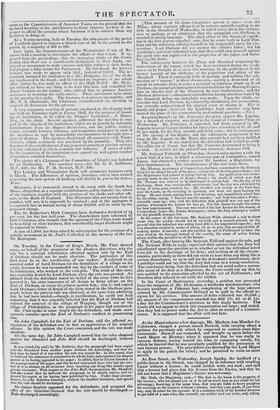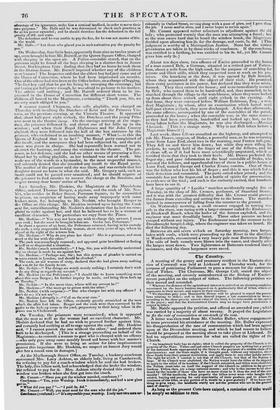At the 1VIansionhouse a few days ago, Mr. Mayhew, late
Member for Colchester, charged a person named Boswell, with carrying about a petition for pecuniary aid, which he suspected to contain some false statements. Boswell was remanded, and brought up again before the Lord Mayor on Monday; when it appeared that he was really in extreme distress' having wasted his time in composing novels, for which he fancied that he was peculiarly qualified by the possession of vast literary powers. The poor fellow was directed by the Lord Mayor to apply to the parish for relief; and he promised to write no more novels.
At Bow Street, on Wednesday, Joseph Sparks, the landlord of a public-11°118e in the Strand, was charged by an informer with retailing liquor without a licence : he could neither write nor read ; and Said that a brewer had given him his licence from the Excise, and that he did not know that a Magistrate's licence was necessary.
Mr. Halls, the Magistrate, said—" The fact is, the house is the property of the brewer; who has placed you in it to sell as much beer as you could for his advantage; knowing, at the same time, that you are liable to heavy penalties for carrying on the business without a licence, and that your goods, if you have any, may be seized for the amount. It is a common trick of the London brewers to get hold of a man who, like yourself, can neither read nor write, and, taking advantage of his ignorance make him a nominal landlord, in order to serve their "own purposes." 111r. Halls said he was determiued to check such practices as Ike as his lancer extended ; and he should therefore fine the defendant in the full penalty of 201. and coats. The defendant said he was unable to pay the fine, for he was not master of'208. isr site world.
Mr. Halls—" Let those who placed you in such &situation pay the penalty for
On Wednesday, four little boys, apparently from nine to twelve years of ago„ were brought before Mr. Burrell, at the Queen Square Office, charged with sleeping in the open air. A Police-constable stated, that on the previous night lie found all the boys sleeping in a shutter-box in James Street, Buckingham Gate : finding that they had no hoine be took them Lb the Station-house. Mr. Burrell inquired whether any of the children were known ? The Inspector said that the eldest boy had just come out of she I louse of Correction, where he had been imprisoned six months. One of the others had also been at the Office before, on a charge of begging. Tie first boy said that he got his living by sweeping the crossings; but snit having got halfpence enough, he was afraid to go home to his mother. The others said nothing ; and Mr. Burrell ordered them to be im- prisoned in the House of Correction for different short terms. The t Whiten all bowed to the Magistrate, exclaimiiig " Thank you, Sir, we are. very much obliged to you."
A woman named Chapman, who sells playbills, was charged on Thursday with insulting the Dutchess of Kent and the Princess Vie-
on the previous evening, at the Victoria Theatre. It appeared that, about hall-past eight o'clock, the Dutchess mid the young Prin- eisss went to the theatre incoy. On the carriage arriving at the stage- r/tact, the prisoner followed it, and thrust one of her bills up to the window ; and when their Royal Highnesses and Sir John Conroy alighted, they were followed into the hall of the box entrance by the prisoner, who exclaimed in an insulting manner, " What i—is this the Queen of England that is to be ? " The Royal party complained of WA insult, and the annoyance they had been subjected to, and the pri- :wrier was given in charge. She had repeatedly been warned not to obstruct the footway, and annoy the visitants to the theatre. The pri- soner, in her defence, said she had no other means of procuring a live- tihood lint by selling playbills, as her husband was out of work. She made rise of the words to a bystander, in the most respectful manntr, and solemnly denied that she intended any insult to the Royal party. The mother of the prisoner said she was there, and was certain that her daughter meant no harm in what she said. Mr. Gregory said, such an insult could not be passed over unnoticed ; and he should require of the prisoner to find sureties to answer the charge at the Sessions, and to-give twenty-four hours' notice of bail.
LaA Saturday, Mr. Hoskins, the Magistrate at the Marylebone Office, ordered Thomas Benger, a pignian, and the cook of Mr. Nes- bitt, who resides in Baker Street, Portman Square, to be committed to prison, on suspicion of having made away improperly with some broken meat, Ike. belonging to Mr. Nesbitt, who brought Benger to ditz Office on this charge. Mr. Hoskins insisted upon having the Cook soil for, notwithstanding Mr. Nesbitt's declaration that be had no corn' plaint to make against her, and that he believed her to be ii woman of excellent character. The particulars we copy from the Times. Mr. Hoskins—" You may not have any wish to charge ttds servant, I mean 3ovr cook ; but she must be brought before me. Go fur her, Policeman." hr about a quarter of an hour, the Policeman returned, having in his custody the cook, a very respectable looking woman, about sixty years of age, whom he placed at the right of the witness .box.
Mr. Hoskins—" Why do you place her there? She is a prisoner, and must stand at the bar with the other."
The cook was accordingly removed; and appeared quite bewildered at finding Ite-rseff in so disgraceful a situation.
Mr. Nesbitt (much astonisheil)—" I beg, Sir, you will distinctly understand that no charge is made by me against her."
lloskins—" Perhaps not, Sir ; but this system of plunder is carried on *same extent in London, and should be checked."
The coek, an o'al woman of sixty, declared that she had given away nothing rat was tit fur the family to eat. Mr. Neshitt—" The things are worth merely nothing ; I certaiuly don't wish th do any thing as regards my servant." Mr. lIuskins (to the Policeinan)—" I Should like to know something more about this man !tenger; let further inquiry be made, and bring them both up an Tiresday."
Mr. Nesbitt—" In the mean time, where will my servant be ?" Mr. floskins—" She mustgo to prison with the other."
Mr. Nesbitt (with surprise)—" But who charges her with any offence? I dun't do tic; it's not my"— Mr. Buskins (abruptly)—" Call on the next case." Mr. Nesbitt here left the Office, evidently greatly astonished at the turn which the affair hail taken. Benger and the cook were then conveyed by the gaoTer to the lock, up room in the yard, preparatory to their being taken in the vim van to Clerkenwell.
On Tuesday,. the prisoners were reexamined ; when it appeared that the man as well as the woman. had an excellent character. Mr. Nesbitt declared that be bad no wish to proceed further against him, and certainly had nothing at all to urge against the cook. Mr. Hoskins said, " I cannot punish the one without the other" and ordered them Seth to be discharged. [ This is a strange proceeding on behalf of the Magistrate—to commit a woman to gaol who is charged with no offence —who only gave away some mouldy bread and bones with her master's permission. If she were to bring an action for false imprisonment against this imperious Mr. Hoskins, we suspect an honest Jury would gist' her a round sum in damages.]
At the Marlborough Street Office, on Tuesday, a hackney-coachman summoned Mrs. Lucy Ashton, an elderly lady, living at Camberwell, fat refusing to pay for a coach-window which he said she had broken. The lady, this fellow said, had acknowledged that she broke the window, Viit refused to pay for it. Mrs. Ashton utterly denied this story ; the window was broken when she first got into the couch.
Bfr. Conant—" Have you_got the window mended, coachman ?" Coachnian—" Yes, your Worship. I took it immediately, and had a new glass grtic in."
" What did you pay ? "—"I paid 3s. M."
Mr. Conant--" Well, you must send for the man who did the job."
Cvachman (confused )-6, It's impossible your.worsbip. I only met two men so- cidentally in Oxford Street, co-sing along with a pane of glass, and I gave them the job. I never seed'm afore, and I never hopes to see'em again."
Mr. Conant appeared rather reluctant to adjudicate against the old lady ; who protested warmly that the man was attempting a fraud ; but as the man swore hard that he heard the window break, the Magistrate decided upon allowing him 2s. for the damage, and costs, 7s. 6d. [This judgment is worthy of a Metropolitan Justice. None but the veriest greenhorns are taken in by these tricks of coachmen. If the coachman was entitled to a farthing, he was entitled to his as. 6d., yet Mr. Conant gives him only 2s.]















 Previous page
Previous page